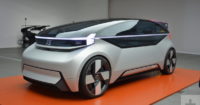The explosive growth in artificial intelligence in recent years — crowned with the meteoric rise of generative AI chatbots like ChatGPT — has seen the technology take on many tasks that, formerly, only human minds could handle. But despite their increasingly capable linguistic computations, these machine learning systems remain surprisingly inept at making the sorts of cognitive leaps and logical deductions that even the average teenager can consistently get right. Read full story here: What the evolution of our own brains can tell us about the future of AI |…
Read MoreTag: Technology
Stressed Out? Blame Bad Technology, New Study Suggests | CTV News
NEW YORK — There is no question that we are all more dependent on technology than ever. So what happens when that tech does not work? In the past, Emily Dreyfuss used an old-school strategy: She yelled. When Amazon’s Alexa spat out wrong answers or misunderstood questions, Dreyfuss let the virtual assistant have it. “I used her as a scapegoat for my feelings,” said Dreyfuss, a writer and editor for Harvard’s Shorenstein Center. “When you have a non-sentient and annoying device in your home, who isn’t doing what you want,…
Read MoreWhat Would It Take To Build A Matrix-Level Simulation Of Reality?
Released almost exactly 20 years ago, The Matrix has gone on to become a cultural phenomenon well beyond the science fiction genre. While it was generally considered science fiction at the time, it helped popularize the Simulation Hypothesis: the idea that we’re all living inside a computer simulation. Read full story here: What Would It Take To Build A Matrix-Level Simulation Of Reality? | Digital Trends
Read MoreMachines vs. Cashiers: Why Shoppers Are So Divided Over Self-Checkout | CBC News
More than a million people clicked on a CBC News story last week about some retail stores removing their self-checkout machines. Thousands of readers also left comments, many staunchly taking a stand either for or against self-checkout. The machines are now ubiquitous in many large retail stores, yet self-checkout remains a divisive issue among Canadians. “A lot of people do see self-checkout as a threat to workers,” said Sylvain Charlebois, a professor at Halifax-based Dalhousie University specializing in food distribution and policy. Read full story here: Machines vs. Cashiers: Why Shoppers Are So Divided…
Read MoreWhy Many Canadians Don’t Love Self-Checkout | CBC News
Brendan Best says self-checkout isn’t worth his time because something often goes wrong, forcing him to seek out assistance. “I would not like to have that type of hassle, so I try to go through cashier lines,” said Best, who lives in Halifax. “There’s nothing in it for me.” A new grocery shopping study out of Dalhousie University suggests many Canadians have dabbled in self-checkout, but few have found reason to embrace the technology — which, along with reducing labour costs, is supposed to make shopping more convenient. Read full story here: Why Many…
Read MoreCanada’s Key Satellite System Hit With Another Launch Delay | CBC News
Canada’s showpiece satellite project has been hit with another launch delay, five years after the first of three spacecraft was scheduled for orbit. The RADARSAT Constellation Mission (RCM) is now set to be launched from a California air force base sometime between Feb. 18 and Feb. 24, 2019. It’s the fifth such delay since the $1 billion project was hit with technical troubles and other problems. The mission follows RADARSAT-1 (1995-2012) and RADARSAT-2 (2007-present), pioneering Canadian satellite projects that use synthetic aperture radar to observe the Earth’s surface in fine detail, even through cloud…
Read MoreThe White House Will Promote The Development Of Autonomous Cars | Digital Trends
The United States Department of Transportation (DOT) has taken important steps to simplify the legal framework surrounding autonomous vehicles. The Trump administration published a verbose policy initiative that outlines the steps it will take to give car and technology companies more freedom to develop, test, and ultimately sell the technology to the public. In an 80-page document, transportation secretary Elaine Chao recognized the pros and cons of self-driving vehicles. On one hand, they can lead to safer roads while making life more productive, more relaxing, or both for the millions of commuters…
Read MoreTechnical Ignorance Is Not Leadership | TechCrunch
There is a peculiar pattern that I have noticed among elites in the United States outside Silicon Valley, which is the almost boastful ignorance of technology. As my colleague Jon Shieber pointed out today, you can see that ignorance among congressmen throughout the whole Facebook/Cambridge Analytica saga. Our president has rarely sent an email, and seems to confine his mobile phone activities to Twitter. One senior policymaker told me a few months ago that she doesn’t know how to turn on her computer. Such a pattern is hardly unique to…
Read MoreTrudeau To Promote Canadian Tech At Microsoft Summit | CTV News
VANCOUVER – Prime Minister Justin Trudeau is expected to pitch major multinational companies on investing in Canada’s technology sector on Wednesday, joining top business leaders inside the closed-door Microsoft CEO Summit in Redmond, Wash. Trudeau’s visit comes as U.S. President Donald Trump’s administration poses both challenges and opportunities for Canada’s high-tech industry. Trump’s “America First” rhetoric and his plans to slash corporate taxes could mean more investment flows south of the border, but his restrictive approach to immigration could draw talent north, experts say. Trudeau is the first sitting head…
Read MoreTelecoms made $37 million last year charging to unlock cellphones – Business – CBC News
Telecoms made $37 million last year charging to unlock cellphones – Business – CBC News Canadian telecoms made a total of $37.7 million last year by charging customers to unlock their cellphones. That’s a whopping 75 per cent jump in this source of revenue compared to 2014. Telecoms often order locked phones from manufacturers that are programmed to work only with their service. Then they charge a fee — typically $50 — to unlock the phone if a customer wants to switch providers. The charge is unpopular with consumers. It…
Read More







